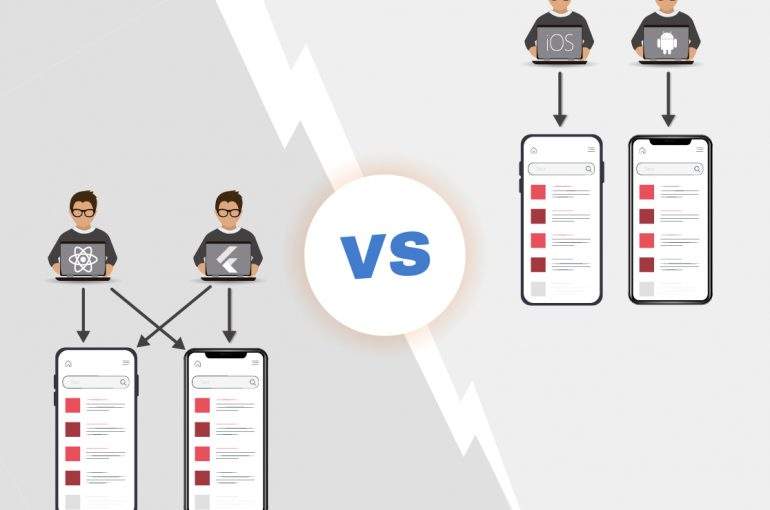The kingdom of mobile app development is pretty diverse and is evolving at a fast pace. Mobile apps have had a real positive impact on businesses worldwide as it has helped them expand exponentially. It is why the global mobile app market has been growing at a CAGR of 18.4% since 2018.
With the rise of mobile app development, a plethora of mobile app development platforms has emerged throughout the globe. Native app development and cross-platform app development are two common app development frameworks. Among these mentioned types, Native and Cross-platform app development have grabbed the eyeballs of business owners all over the world.
What is Native App Development?
The term “native app development” describes the process of creating a mobile app that is tailored to a single platform. Platform-specific programming languages and tools were used to construct the app. You can make native Android apps with Java or Kotlin, and iOS apps with Swift or Objective-C, for example. Because of their speed, native apps are thought to provide a better user experience. The aesthetics are also in line with the platform’s UX, enhancing the user experience. However, because they must develop native apps for two platforms at the same time, startups are concerned about the high cost of native app development.
Advantages of opting Native App Development
- High Speed – Native mobile apps are faster than hybrid and cross-platform apps since they don’t have as much sophisticated code as hybrid and cross-platform apps.
- Offline Functionality – One of the most appealing features of native apps is that they work flawlessly even when there is no internet connection. Users will gain since they will be able to use all of the app’s capabilities even if they are in airplane mode or offline.
- Enhanced Interaction– New entrepreneurs may anticipate native apps to give a more intuitive and participatory user experience. Native apps follow standards that ensure a better user experience that is perfectly aligned with the operating system in every aspect because they are created for a specific operating system.
- Fewer Bugs– Managing two different codebases becomes challenging as compared to a single codebase, such as in native app development. Native programs have fewer issues because they have a single codebase and don’t rely on cross-platform tools.
When Should You Consider Creating a Native App?
- Your target audience will be using your app for the first time, and you want to make a good first impression by giving them the best possible app experience.
- Writing code that is exclusive to a single platform is required.
- Businesses are getting more interested in 3D games and animations.
- You want to attract a huge number of DAUs and venture capitalists for product funding, as well as design an easy-to-use yet intuitive app.
- GPS, camera, and other device-specific functionality must be incorporated.
What Is Cross-Platform App Development?
Cross-platform development is the process of creating an app that works across many platforms. React Native, Xamarin, and Flutter are utilized to accomplish this, and the resulting apps may be used on both Android and iOS.
While cross-platform development saves time and money, it degrades the quality of the end product. It’s difficult to design an app that works effectively across different platforms, and the software will need to go via an additional abstraction layer, resulting in poor performance. Startups will be attracted to cross-platform programming since it saves time and money. However, you should keep in mind that customizing the program outside the framework’s limitations may be more difficult.
Advantages of opting Cross-Platform App Development
- Cost-effective– A cross-platform app development framework has the ability to support a wide range of platforms, ensuring a global market reach and greater brand popularity for new firms looking for quick momentum. Furthermore, it also reduces upfront costs.
- Hassle-free Option & Fast Development– For developers and business owners, having reusable code that is backed by enhanced productivity and efficiency is a major plus in the long run. In this aspect, a cross-platform app development framework provides an edge over other solutions.
- Efficient Product Maintenance– Because cross-platform app development uses a single codebase, businesses can rest easy, knowing that their outputs will be flawless. Because there is only one codebase, testing and deploying changes and updates is easier, resulting in superior accuracy and quality mobile applications.
- Reusability of Code– When designing cross-platform programs, developers don’t have to write separate code for each operating system. A shared codebase could be used to migrate code between platforms.
When Should a Cross-Platform App Be Created?
- You want to deliver a mobile application on various platforms with a limited budget, time, and resources.
- Both iOS and Android app users must be targeted.
- You need a faster app development process.
- The software isn’t very complicated, and it doesn’t necessitate a lot of platform-specific functionality.
Wrapping Up!!
Both native and cross-platform software development has advantages and disadvantages. As a result, it’s all about the specific business requirement before deciding on an app development framework. IT business owners should figure out exactly what they want before deciding on an app development framework. And the decision should be based on current as well as future factors.
Ready to launch the custom website of your dreams, but need some help getting started? That’s where iBoon Technologies can help!
iBoon Technologies – Web Design & E-Commerce Application Development Company in Ahmedabad, India. We have a dedicated development team with extensive expertise and hands-on experience.


